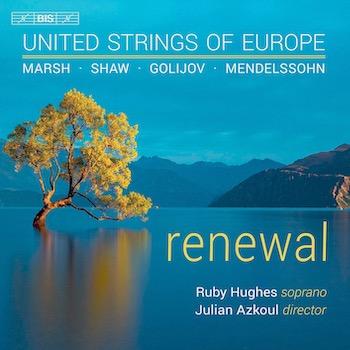Classical Album Review: United Strings of Europe’s “Renewal”
By Jonathan Blumhofer
A young ensemble, the USE is a technically accomplished one and, regardless of the interpretive strengths or weaknesses of each reading, the group’s sheer skill level is evenly impressive.

The title of the United Strings of Europe’s new disc, Renewal, refers, we’re told, to the fact that the album’s selections (which are mostly pieces of recent vintage) are reworkings of music originally conceived for different instrumental forces. Thus, the thought goes, these new settings offer new leases on life to these pieces. In general, that’s borne out by the performances — but not always.
Indeed, the one piece here that doesn’t really work is USE concertmaster Julian Azkoul’s string-orchestra arrangement of Felix Mendelssohn’s String Quartet no. 6. This is surprising, especially considering that the F-minor Quartet, Mendelssohn’s last, is one of the composer’s most dramatic and furious pieces.
Alas, expanding the Quartet’s forces seems to have had the effect of undercutting the music’s immediacy: too much of the USE’s playing here is downright sleepy and lacking in excitement. Only in the iterations of the opening subject of the first movement, with its tense phrases and well-shaped hairpin dynamics, does the setting and reading live up to its promise.
Otherwise, the Allegro loses gas whenever that opening theme isn’t involved. The second movement lumbers: there’s no grace, spirit, or energy to the ensemble’s performance despite a reasonably spirited tempo. While the Andante sings warmly, its climaxes don’t pack enough of an emotional, dynamic, or rhythmic wallop; as with the rest of the interpretation, it needs to be bigger, intenser, more dramatic. So does the finale, whose craggy syncopations and exchanges between sections are all too placid.
Ultimately, this is a Mendelssohn that is too nice; it requires much more in terms of dynamic contrasts, articulation, vigor, coloristic shadings, and rhythmic shaping in order to come to life.
Happily, the rest of the disc largely delivers on those counts.
Azkoul’s arrangement of Joana Marsh’s In Winter’s House, a rich-toned, hymn-like essay that seems to channel Vaughan Williams in its distinctive way, is gorgeous.
Caroline Shaw’s Entr’acte, heard here in the composer’s string orchestra version, proves likewise agreeable. The USE’s reading is smartly directed but manages to capture all the important elements of Shaw’s style, particularly its special blend of mystery and playfulness.
The same goes for the ensemble’s account of Shaw’s haunting And the Swallow.
However, the most striking piece on Renewal is Osvaldo Golijov’s Three Songs. Consisting of three works collected as a concert piece for Dawn Upshaw in the early ’00s, the Songs draw widely from Golijov’s oeuvre: the first adapts his 1992 Lullaby and Doina; the second is “Lúa descolorida” from the acclaimed St. Mark Passion; and the last is a setting of Emily Dickinson’s “How slow the wind.”
Welsh soprano Ruby Hughes is firmly in her element in each, singing with becoming warmth and clarity of tone, as well as impeccable intonation and diction.
Giving the premiere recording of the string-orchestra version of the piece, the USE imbues Golijov’s writing with a compelling lightness of touch and rightness of character. The heterophonic textures at the end of the first song are wonderfully blurry, while the second floats and, what’s more, includes some beautiful dovetailing between Hughes’s lines and Azkoul’s solos. Meanwhile, the finale pulses nervously.
All in all, this is a fervent, engaging account by all involved of what is a truly fine, underrated piece.
Throughout the recording, Bis’s sonics are natural and resonant. Though a young ensemble, the USE is a technically accomplished one and, regardless of the interpretive strengths or weaknesses of each reading, the group’s sheer skill level is evenly impressive.
Jonathan Blumhofer is a composer and violist who has been active in the greater Boston area since 2004. His music has received numerous awards and been performed by various ensembles, including the American Composers Orchestra, Kiev Philharmonic, Camerata Chicago, Xanthos Ensemble, and Juventas New Music Group. Since receiving his doctorate from Boston University in 2010, Jon has taught at Clark University, Worcester Polytechnic Institute, and online for the University of Phoenix, in addition to writing music criticism for the Worcester Telegram & Gazette.
